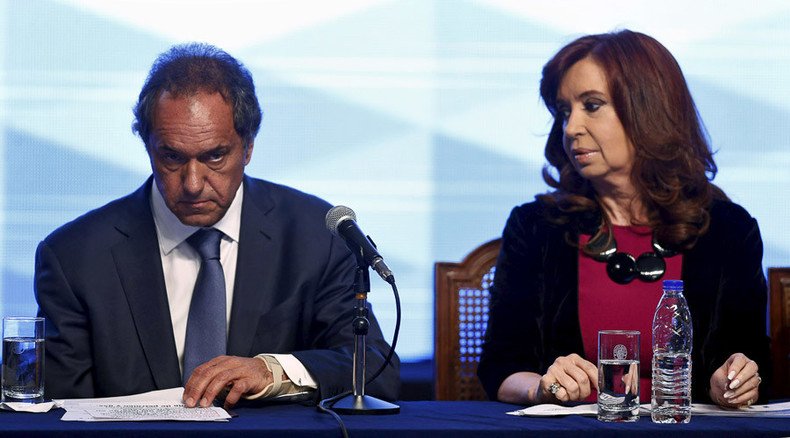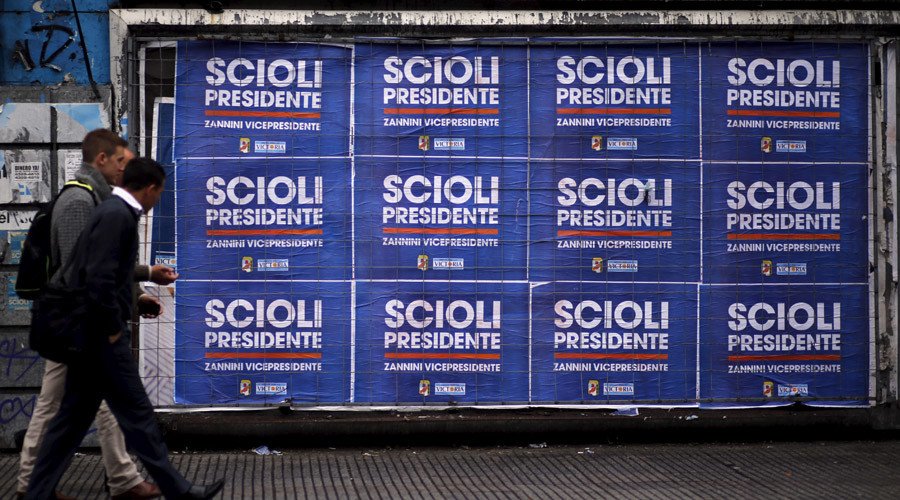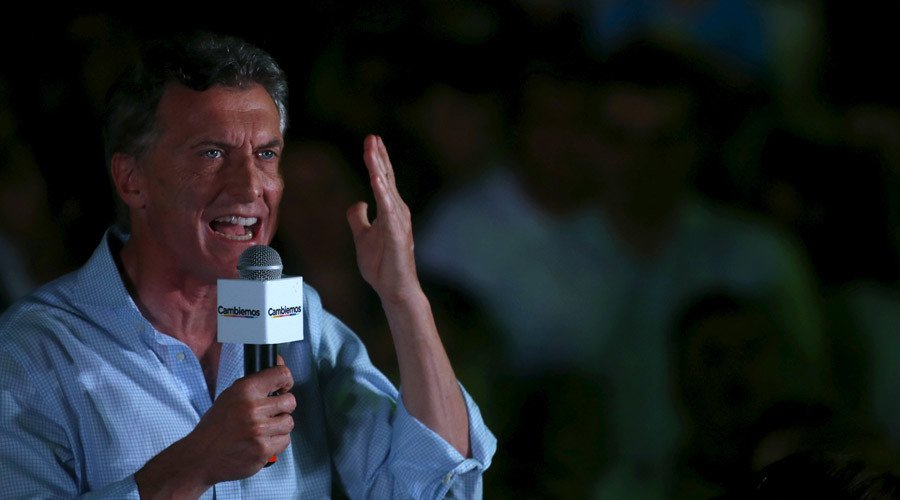‘Kirchnerismo’ legacy looms large as Argentina goes to the polls

Cristina Fernandez de Kirchner’s handpicked successor is the favorite to replace her, but if he wins, Daniel Scioli will have a tough job matching her popularity and generosity with an economy stuck in a cul-de-sac.
By 12 a.m. local time turnout was at 20 percent, in what was expected to be a well-attended election in a country where voting is compulsory.
Argentina's presidential frontrunner went to the polls today in ripped jeans #Elecciones2015https://t.co/RaRCMgQYJRpic.twitter.com/UrcuZSNKPK
— Casey Tolan (@caseytolan) October 25, 2015On Sunday, Argentinians are also picking half of the lower house of parliament, a new upper house, or senate, and a new president for a four year term, to replace Fernandez, who is not eligible for more than two consecutive terms in office.
Scioli, from her Peronist party, PJ, leads with 42 percent of the votes in the latest polls. He will need to gain 45 percent to win without a runoff, or more than 40 and be 10 points ahead of his nearest rival.
Scioli's final pre-election rally draws thousands in Buenos Aires https://t.co/vARrKeLjLjpic.twitter.com/x2jS9rNaxX
— Ruptly (@Ruptly) October 23, 2015That man is Mauricio Macri, a former businessman and current mayor of Buenos Aires, who is polling at around 29 percent. The X factor could be provided by Sergio Massa, who headed Fernandez’ cabinet, but is also attempting to appeal to Argentina’s private sector. While he is unlikely to win, it is unclear who Massa’s 20 percent of the vote will go to in case of a second round.
Elected in 2007, following her husband Nestor Kirchner’s four year term, Fernandez has offered a mixture of populist socialism and statism, bolstered by high commodity prices, combined with a strident nationalist rhetoric. She has thrived on conflict, needling the West, and singling out enemies at home, be it capitalists, farmers or political opponents.
Summary of final polls 1st round: Scioli 37-41% [FpV]. Macri 27-29%[PRO/UCR]. Massa 20-23% [UNA]. Stolbizer 3-5% [FAP] #elections#Argentina
— Peter Scheffer (@peter_scheffer) October 23, 2015On her watch, poverty has been radically reduced though the opposition have cast doubt on the exact extent of the gains - and state investment has ballooned.
But with foreign currency reserves running low, inflation is at 25 percent and budget deficit at 7, the economy is predicted to grow by less than 1 percent this year, and go into a recession in 2016.
Argentina has also become an economic pariah state among Western institutions. Last year, the country defaulted on $20 billion of foreign debt obligations, which arose from a previous default in 2001. Fernandez said the country had no duty to pay “vulture funds” that bought up its bonds on the cheap, and is now engaged in a complex legal case against US investors.

Separately, the International Monetary Fund and internal opponents have accused the government of manipulating key economic statistics. Foreign investment in Argentina has fallen, though China has stepped in with loans and joint infrastructure projects.
All three candidates have promised to dismantle the complex system of budget boosters and protectionist controls introduced by Kirchner's government, and put an end to dysfunction. While Scioli has promised to do so while maintaining continuity with the social programs instituted by Fernandez, the other candidates have painted themselves as openly pro-business, and have called for a faster speed of reform to stave off a full-scale default.

With likely coalition majorities at all levels of government, Scioli, a former vice president with a good grasp of party politics, would find it easiest to execute his reform plans, while Macri is likely to struggle with resistance at local, regional and parliamentary level.
An intriguing aspect is the political future of Fernandez. The 62-year-old leaves the office with an approval rating of over 50 percent predominantly among the rural and poorer parts of the population and has allies in almost all key positions.
#Argentina´s Kirchner leaves a stalling economy behind. Most issues domestically caused. Via @TheEconomistpic.twitter.com/XK9VFAsJnY
— Markus Schuller (@panthera_s) October 24, 2015The Argentinian media has widely speculated that with no legal barriers ahead, the populist politician may attempt to return for a third term in power in 2019.












